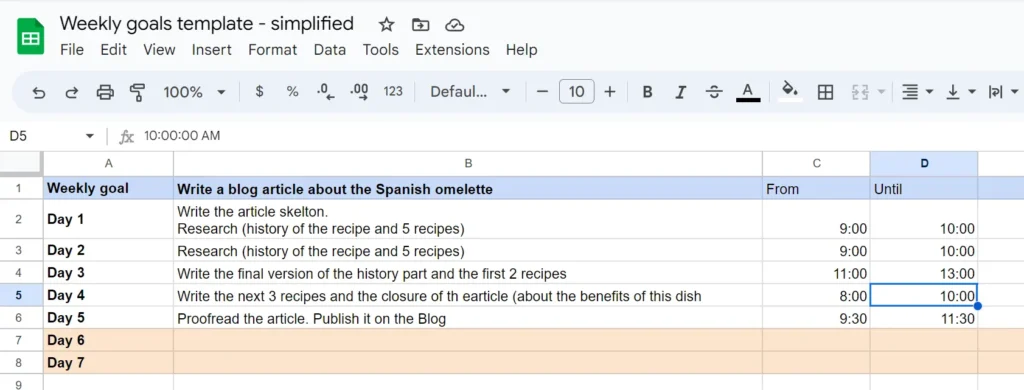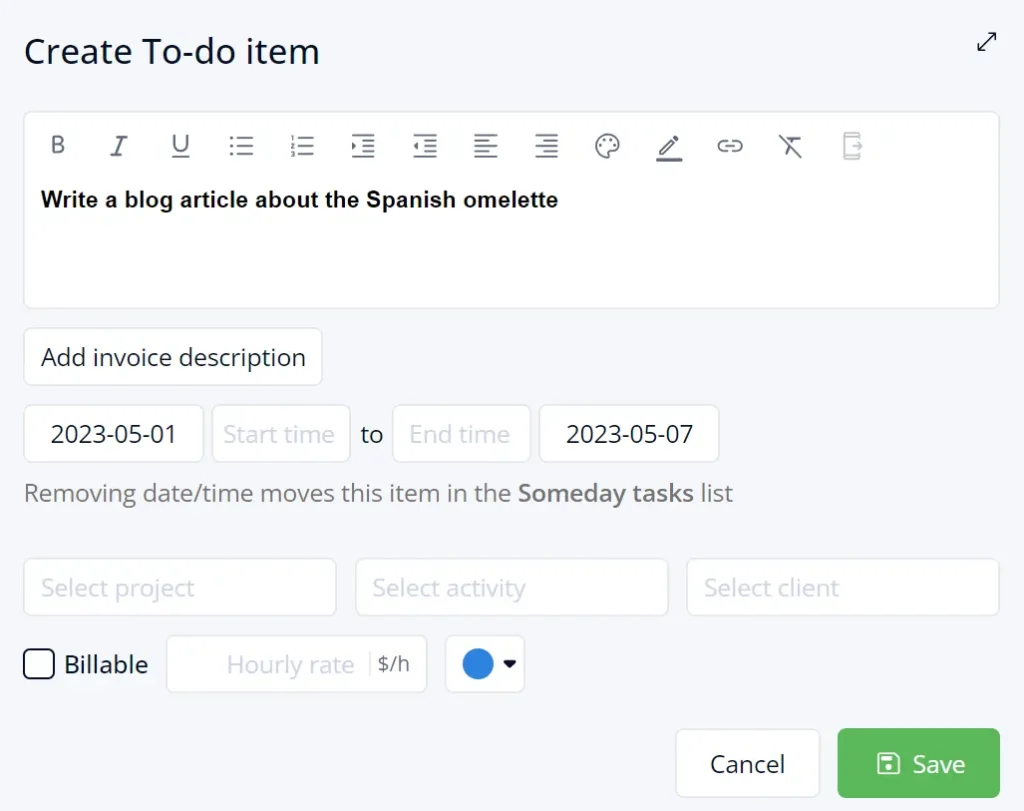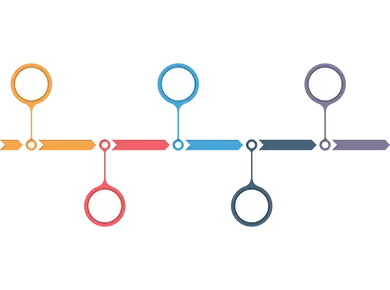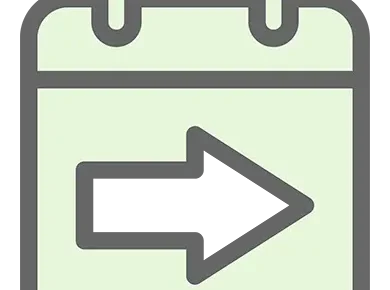Why are weekly goals so important?
I’m sure you’re familiar with the following scenario: you set a great goal for yourself with a 6-months deadline. You even write down the individual steps you need to achieve it. And then the little red monster starts its job: “Stay calm. You have plenty of time. You set your deadline for 6 months, especially to ensure you can do it until then.” This goes on for the next 5 months. At that point, you realize that you have three choices: start working day and night and do a sloppy job just to achieve the goal, extend your deadline, or, even worse, give up doing it altogether. This is the moment when you’re deeply disappointed with yourself since you’re not happy with either of the three choices.
Breaking down your long-term plan into weekly goals will help you avoid the above scenario because
- They keep you on your toes. The deadline is no longer months away, you must achieve something by the end of the week.
- You can focus on a much smaller task than the whole project; this will increase your productivity.
- You can immediately see if you have delays and take the appropriate measures;
- You can easily break down the week’s goals into individual tasks and put them in your daily to-do lists for the given week;
What makes a weekly goal a good one?
Your weekly targets must be:
| Accurate | Measurable | Achievable | Relevant |
|---|---|---|---|
| Your weekly goal must be crystal clear. | You must get tangible results by achieving your weekly goal objective. | You don’t want to set yourself up for failure. Your target must be realistic. | Your weekly goal must take you one step closer to the long-term plan it belongs to. |

Best practices
The best approach for setting up weekly goals is to use the SMART goal approach.
How to set weekly goals in 3 easy steps
- Choose a long-term objective. Select a more significant goal you wish to achieve. One that will take months to complete.
- Break it down into smaller steps. Write a list of all the tasks you must complete to achieve your goal. These tasks must be achievable in 1 week or less.
- Set your deadlines. Look at the deadline of your big objective. Set the deadlines of the weekly goals such that you finish all of them by the primary deadline. This is when you can get a realistic view if this is possible, or you must reschedule your long-term target.
How to achieve your weekly goals
If we let our weekly goal be just something we must achieve by the end of the week, probably the following will happen:
- in the first 2-3 days, we stay calm
- in the next 1-2 we start thinking about it, but it’s not burning
- and then in the last 1-2 days, we try to do everything regarding this goal. This can only lead to
- an unachieved goal or
- a job poorly done
To avoid these issues, the best solution is to
- Break down our weekly goal into 5 or 7 smaller steps (depending on whether we wish to work on it on the weekend).
- On Sunday evening (or Saturday if the work week starts on Sunday), we schedule an exact time each day to do one of these daily goals.
Additionally, to efficiently achieve your weekly goals, it’s essential to utilize tools that streamline your workflow. For instance, Zero Bounce email validation checker helps ensure you’re not wasting time reaching out to invalid email addresses, Asana for project management and Grammarly for real-time content optimization can further automate your processes, enhancing both productivity and time management. These tools allow you to focus on high-priority tasks while reducing manual effort and minimizing errors.

Best practices
You can use The SWDH productivity system for this planning of your tasks.
Tools you can use to set up weekly goals
Templates
You can use a simple Google Docs or Excel-like spreadsheet to break down your weekly goal into daily tasks and schedule them.
You can download the Weekly goals template – simplified from:
A more complex template is available for you in the SWDH Downloadable Template section of the SWDH article. This template is explained in detail in the specified blog article.
Paper-based planners
There are many Planners and Organizers available on the market. These are great to use and will serve their purpose well.
However, they have several disadvantages compared to using a digital solution.
- If you leave it at home, you have a problem. You don’t have your daily tasks list and cannot make new entries that day.
- You have no copy-paste, undo, or find on your paper-based planner.
Online apps
Using an online planner has huge advantages
- It is always available
- You can access it from any of your devices
- You can quickly reschedule a task by dragging it on the calendar
- You can easily transform a someday job into a to-do item or vice versa
- You can see your daily/weekly/monthly schedules at a glimpse
- You don’t have to remember where your paper-based planner is or where you saved the template file for a goal.
Simply create a weekly job by setting the following properties:
- Start date: the first day of the week
- End date: the last day of the week
- Start and End time: leave them blank
This way, the task will appear for the entire week, above all the daily tasks.
Now, all you have to do is to break it down into daily tasks and create a To-do item for each day. This time you also specify the exact time interval you wish to work on it.
Advantages and disadvantages of setting weekly goals
Advantages
- Improve your focus: having precisely defined what you want to achieve in the coming week helps you focus on it instead of figuring out what you should do
- Stop Procrastination and Precrastination : Once you know that from 10:00 until 12:00, for example, you must complete a given task, you will not waste your time on Social media, Emails, Phone calls, … You will work on the given task.
- Do wonders for your self-confidence: Seeing that week-by-week you accomplish great things will go hand-in-hand with increasing your self-esteem and your feeling that you can achieve anything.
- Brings order and effectiveness into your life: You know precisely when and what you must do. This will make you very productive, increase your effectiveness, and give you more free time.
Disadvantages
- It could affect your flexibility: having set the exact schedules for your entire week can cause an issue when something unexpected happens. The best solution to avoid this is to leave some free time between your daily tasks for the unexpected.
- It makes you feel more pressured: I listed this in the Disadvantages section, but it’s actually an Advantage. Yes, weekly tasks do put some extra pressure on you. But this is just you coming out of your comfort zone. And this, even if it’s sometimes unpleasant, is a great thing: it forces us to better ourselves and achieve our goals!
- Sometimes you won’t be proud of yourself: suppose you have 1 goal for each working day (5/week). You achieve 4 of them and 1 remains. Of course, by human nature, this will make you feel bad. However, sometimes it can happen that in a given week, you only achieve a few of your goals. If you have a good reason, reschedule that goal and move on, you’ve done all you can. But without a plausible reason, well, you can feel a little guilty. This will help you be more productive next time.
Once you’ve mastered the habit of setting weekly goals, you can elevate your planning by applying a professional framework. For leaders managing complex projects, learning how to set SMART goals for project managers is the logical next step.









